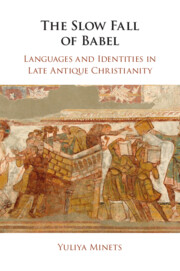Book contents
- The Slow Fall of Babel
- The Slow Fall of Babel
- Copyright page
- Dedication
- Contents
- Abbreviations
- Acknowledgments
- Introduction: Awakening to Linguistic Otherness
- Chapter 1 Meeting the Alloglottic Other: The Socio-Linguistic Landscape of the Ancient Mediterranean and the Spread of Christianity
- Chapter 2 Languages and Identities in Greco-Roman and Jewish Antiquity
- Chapter 3 The Tower of Babel and Beyond: The Primordial Linguistic Situation, the Original Language, and the Start of Linguistic Diversification
- Chapter 4 Speaking in Tongues in Christian Late Antiquity
- Chapter 5 Foreign Languages and the Discourse of Otherness
- Chapter 6 The Languages of Saints and Demons
- Conclusion: What’s in the Language?
- Bibliography
- Index
Chapter 3 - The Tower of Babel and Beyond: The Primordial Linguistic Situation, the Original Language, and the Start of Linguistic Diversification
Published online by Cambridge University Press: 02 December 2021
- The Slow Fall of Babel
- The Slow Fall of Babel
- Copyright page
- Dedication
- Contents
- Abbreviations
- Acknowledgments
- Introduction: Awakening to Linguistic Otherness
- Chapter 1 Meeting the Alloglottic Other: The Socio-Linguistic Landscape of the Ancient Mediterranean and the Spread of Christianity
- Chapter 2 Languages and Identities in Greco-Roman and Jewish Antiquity
- Chapter 3 The Tower of Babel and Beyond: The Primordial Linguistic Situation, the Original Language, and the Start of Linguistic Diversification
- Chapter 4 Speaking in Tongues in Christian Late Antiquity
- Chapter 5 Foreign Languages and the Discourse of Otherness
- Chapter 6 The Languages of Saints and Demons
- Conclusion: What’s in the Language?
- Bibliography
- Index
Summary
The chapter begins with the discussion of the story about the tower of Babel and the confusion of tongues (Gen 11.1–9), the event which was usually but not always understood as the start of linguistic diversification. The chapter explores early Christian ideas about the primordial language, usually identified with Hebrew. The history of Hebrew and the attempts of late antique Christians to define their relations to this would-be original tongue occupy the larger part of the chapter. Fourth- and fifth-century writers discussed whether the original tongue ceased or continued to exist after Babel, and who – Heber or Abraham – was instrumental in preserving the original tongue. These biblical figures and various scenarios of language history they represented were claimed by competing Christian and Jewish historical discourses. These linguistic discussions contributed to consolidating their corresponding religious identities. The alternatives to the idea of Hebrew’s primordiality were also attested; they bear witness to the continuous debates about originality, ontological power, and the relative prestige of languages in Late Antiquity. The chapter attempts to reconstruct Christian attitudes to the linguistic diversity, their views on the history and evolution of other (non-Hebrew) languages, and to contextualize ideas about the language of God in Jewish–Christian polemics.
Keywords
- Type
- Chapter
- Information
- The Slow Fall of BabelLanguages and Identities in Late Antique Christianity, pp. 99 - 169Publisher: Cambridge University PressPrint publication year: 2021

